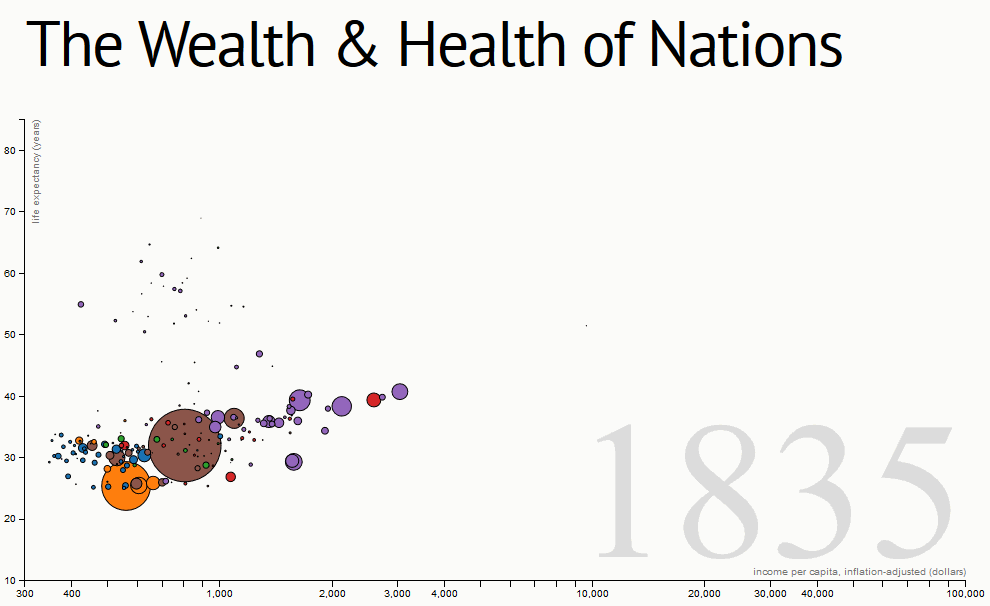如何启动和停止D3气泡图的动画
我正在努力复制健康与健康财富国家图表。
http://bost.ocks.org/mike/nations/:

当我点击开始时,图表的动画效果很好,如果我点击停止动画停止。但是,如果我下次点击开始,它从头开始而不是从我停止的地方开始?我如何从我离开的地方制作动画?
以下是代码:
<h1>The Wealth & Health of Nations</h1>
<p id="chart"></p>
<input type="submit" value="Start" onclick=start();>
<input type="submit" value="Stop" onclick=stop();>
<script src="http://d3js.org/d3.v2.js?2.8.1"></script>
<script>
// Various accessors that specify the four dimensions of data to visualize.
function x(d) { return d.income; }
function y(d) { return d.lifeExpectancy; }
function radius(d) { return d.population; }
function color(d) { return d.region; }
function key(d) { return d.name; }
// Chart dimensions.
var margin = {top: 29.5, right: 29.5, bottom: 29.5, left: 59.5},
width = 960 - margin.right,
height = 500 - margin.top - margin.bottom;
// Various scales. These domains make assumptions of data, naturally.
var xScale = d3.scale.log().domain([300, 1e5]).range([0, width]),
yScale = d3.scale.linear().domain([10, 85]).range([height, 0]),
radiusScale = d3.scale.sqrt().domain([0, 5e8]).range([0, 40]),
colorScale = d3.scale.category10();
// The x & y axes.
var xAxis = d3.svg.axis().orient("bottom").scale(xScale).ticks(12, d3.format(",d")),
yAxis = d3.svg.axis().scale(yScale).orient("left");
// Create the SVG container and set the origin.
var svg = d3.select("#chart").append("svg")
.attr("width", width + margin.left + margin.right)
.attr("height", height + margin.top + margin.bottom)
.append("g")
.attr("transform", "translate(" + margin.left + "," + margin.top + ")");
// Add the x-axis.
svg.append("g")
.attr("class", "x axis")
.attr("transform", "translate(0," + height + ")")
.call(xAxis);
// Add the y-axis.
svg.append("g")
.attr("class", "y axis")
.call(yAxis);
// Add an x-axis label.
svg.append("text")
.attr("class", "x label")
.attr("text-anchor", "end")
.attr("x", width)
.attr("y", height - 6)
.text("income per capita, inflation-adjusted (dollars)");
// Add a y-axis label.
svg.append("text")
.attr("class", "y label")
.attr("text-anchor", "end")
.attr("y", 6)
.attr("dy", ".75em")
.attr("transform", "rotate(-90)")
.text("life expectancy (years)");
// Add the year label; the value is set on transition.
var label = svg.append("text")
.attr("class", "year label")
.attr("text-anchor", "end")
.attr("y", height - 24)
.attr("x", width)
.text(2000);
function start()
{
//alert("Start Clicked");
// Load the data.
d3.json("nations_new.json", function(nations) {
// A bisector since many nation's data is sparsely-defined.
var bisect = d3.bisector(function(d) { return d[0]; });
// Add a dot per nation. Initialize the data at 2000, and set the colors.
var dot = svg.append("g")
.attr("class", "dots")
.selectAll(".dot")
.data(interpolateData(2000))
.enter().append("circle")
.attr("class", "dot")
.style("fill", function(d) { return colorScale(color(d)); })
.call(position)
.sort(order);
// Add a title.
dot.append("title")
.text(function(d) { return d.name; });
// Add an overlay for the year label.
var box = label.node().getBBox();
var overlay = svg.append("rect")
.attr("class", "overlay")
.attr("x", box.x)
.attr("y", box.y)
.attr("width", box.width)
.attr("height", box.height);
//.on("mouseover", enableInteraction);
// Start a transition that interpolates the data based on year.
svg.transition()
.duration(30000)
.ease("linear")
.tween("year", tweenYear)
.each("end", enableInteraction);
// Positions the dots based on data.
function position(dot) {
dot .attr("cx", function(d) { return xScale(x(d)); })
.attr("cy", function(d) { return yScale(y(d)); })
.attr("r", function(d) { return radiusScale(radius(d)); });
}
// Defines a sort order so that the smallest dots are drawn on top.
function order(a, b) {
return radius(b) - radius(a);
}
// After the transition finishes, you can mouseover to change the year.
function enableInteraction() {
var yearScale = d3.scale.linear()
.domain([2000, 2009])
.range([box.x + 10, box.x + box.width - 10])
.clamp(true);
// Cancel the current transition, if any.
svg.transition().duration(0);
overlay
.on("mouseover", mouseover)
.on("mouseout", mouseout)
.on("mousemove", mousemove)
.on("touchmove", mousemove);
function mouseover() {
label.classed("active", true);
}
function mouseout() {
label.classed("active", false);
}
function mousemove() {
displayYear(yearScale.invert(d3.mouse(this)[0]));
}
}
// Tweens the entire chart by first tweening the year, and then the data.
// For the interpolated data, the dots and label are redrawn.
function tweenYear() {
var year = d3.interpolateNumber(2000, 2009);
return function(t) { displayYear(year(t)); };
}
// Updates the display to show the specified year.
function displayYear(year) {
dot.data(interpolateData(year), key).call(position).sort(order);
label.text(Math.round(year));
}
// Interpolates the dataset for the given (fractional) year.
function interpolateData(year) {
return nations.map(function(d) {
return {
name: d.name,
region: d.region,
income: interpolateValues(d.income, year),
population: interpolateValues(d.population, year),
lifeExpectancy: interpolateValues(d.lifeExpectancy, year)
};
});
}
// Finds (and possibly interpolates) the value for the specified year.
function interpolateValues(values, year) {
var i = bisect.left(values, year, 0, values.length - 1),
a = values[i];
if (i > 0) {
var b = values[i - 1],
t = (year - a[0]) / (b[0] - a[0]);
return a[1] * (1 - t) + b[1] * t;
}
return a[1];
}
});
}
function stop()
{
//alert("stop Clicked");
svg.transition().duration(0);
}
json文件是:
[
{
"name":"Angola",
"region":"Sub-Saharan Africa",
"income":[[2000,2446.65],[2001,2479.69],[2002,2773.29],[2003,2785.39],[2004,3007.11],[2005,3533],[2006,4069.56],[2007,4755.46],[2008,5228.74],[2009,5055.59]],
"population":[[2000,10442812],[2001,10623424],[2002,10866106],[2003,11186202],[2004,11521432],[2005,11827315],[2006,12127071],[2007,12420476],[2008,12707546]],
"lifeExpectancy":[[2000,43.56],[2001,43.86],[2002,44.22],[2003,44.61],[2004,45.05],[2005,45.52],[2006,46.02],[2007,46.54],[2008,47.06],[2009,47.58]]
},
{
"name":"china",
"region":"East Asia & Pacific",
"income":[[2000,12446.65],[2001,12479.69],[2002,12773.29],[2003,12785.39],[2004,12007.11],[2005,12533],[2006,12069.56],[2007,12755.46],[2008,12228.74],[2009,12055.59]],
"population":[[2000,31542812],[2001,31623424],[2002,31866106],[2003,32186202],[2004,31521432],[2005,31827315],[2006,32127071],[2007,32420476],[2008,32707546]],
"lifeExpectancy":[[2000,53.56],[2001,63.86],[2002,64.22],[2003,64.61],[2004,76.05],[2005,66.52],[2006,86.02],[2007,87.54],[2008,89.06],[2009,68.58]]
},
{
"name":"India",
"region":"South Asia",
"income":[[2000,22446.65],[2001,22479.69],[2002,22773.29],[2003,22785.39],[2004,22007.11],[2005,22533],[2006,22069.56],[2007,22755.46],[2008,22228.74],[2009,22055.59]],
"population":[[2000,41542812],[2001,41623424],[2002,41866106],[2003,42186202],[2004,41521432],[2005,41827315],[2006,42127071],[2007,42420476],[2008,42707546],[2009,42707546]],
"lifeExpectancy":[[2000,43.56],[2001,43.86],[2002,44.22],[2003,64.61],[2004,56.05],[2005,56.52],[2006,66.02],[2007,68.54],[2008,67.06],[2009,73.58]]
}
]
2 个答案:
答案 0 :(得分:2)
在start功能中,您需要跟踪当前显示的年份,例如使用全局变量:
var thisYear = 2000;
// lots of code...
function displayYear(year) {
thisYear = year;
dot.data(interpolateData(year), key).call(position).sort(order);
label.text(Math.round(year));
}
然后,您需要根据该变量的值修改它开始的年份:
function tweenYear() {
var year = d3.interpolateNumber(thisYear, 2009);
return function(t) { displayYear(year(t)); };
}
答案 1 :(得分:2)
我正在做一些非常相似的事情,Lars的建议让我走得很远。但是,每次开始时我都会不断重复点。我后来发现了以下内容:
如果您想要在每次选择开始按钮时都不重复点,则需要将以下代码添加为start()函数的一部分,理想情况是在点之前最初添加:
svg.selectAll(".dot").remove()
这将删除以前的.dot元素;假设您已经设置了Lars提到的thisYear全局变量,随后会创建新的.dot元素。
相关问题
最新问题
- 我写了这段代码,但我无法理解我的错误
- 我无法从一个代码实例的列表中删除 None 值,但我可以在另一个实例中。为什么它适用于一个细分市场而不适用于另一个细分市场?
- 是否有可能使 loadstring 不可能等于打印?卢阿
- java中的random.expovariate()
- Appscript 通过会议在 Google 日历中发送电子邮件和创建活动
- 为什么我的 Onclick 箭头功能在 React 中不起作用?
- 在此代码中是否有使用“this”的替代方法?
- 在 SQL Server 和 PostgreSQL 上查询,我如何从第一个表获得第二个表的可视化
- 每千个数字得到
- 更新了城市边界 KML 文件的来源?